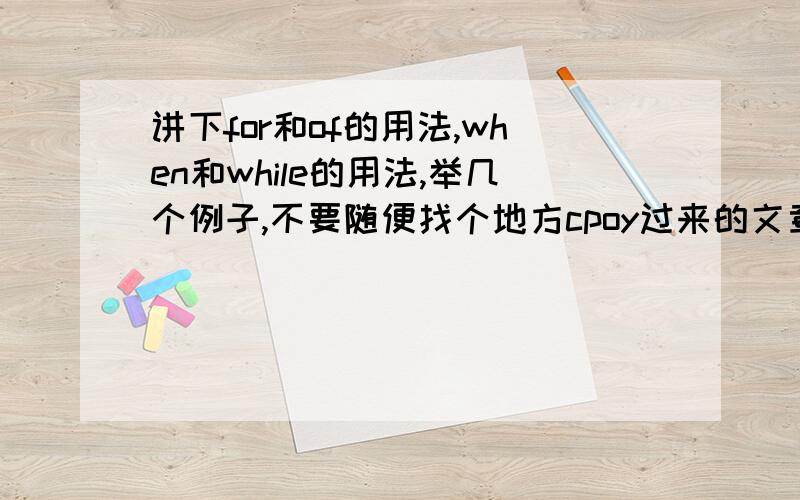讲下for和of的用法,when和while的用法,举几个例子,不要随便找个地方cpoy过来的文章,明白了还有额外的分
来源:学生作业帮助网 编辑:作业帮 时间:2024/11/30 20:15:23

讲下for和of的用法,when和while的用法,举几个例子,不要随便找个地方cpoy过来的文章,明白了还有额外的分
讲下for和of的用法,when和while的用法,
举几个例子,不要随便找个地方cpoy过来的文章,明白了还有额外的分
讲下for和of的用法,when和while的用法,举几个例子,不要随便找个地方cpoy过来的文章,明白了还有额外的分
when和while引导的时间状语从句与这一时态连用.所以区别when和while的用法成了这一单元的难点.
(一)、when,while都有“当……时候”的意思.when既可表示某一点时间,也可以表示某一段时间 .在when引导的时间状语从句中,其谓语动词可以是延续性的,也可以是非延续性的,可与主句中的谓语动词同时发生,也可在其后发生.
例如:
1、I was just reading a book when she came into my room.她走进我房间时,我正在看书.
2、Were you writing when the teacher came in?老师进来的时候,你在写信吗?
3、When he was a child he was always trying out new ideas.他小时候就常常试验一些新的设想.
(二)、while只能表示某一段时间,不能表示某一点时间.在while引导的时间状语从句中,其谓语动词只能是延续性的,而且也只能与主句中的谓语动词同时发生或存在.
例如:
1、While Jim was mending his bike,Lin Tao came to see him.正当吉姆修自行车时,林涛来看他.
2、You can’t do your homework while you’re watching TV.你不能一边看电视一边做家庭作业.
(三)、另外,when和while的区别还在于:while引导的时间状语从句多用进行时态,而when引导的时间状语从句多用一般时态.
例如:
1、While they were talking ,the bell rang.正在他们谈话的时候,上课铃响了.
2、I was doing my homework when my mother came back home yesterday evening.昨天晚上妈妈回家的时候,我正在做家庭作业
of 属于(某人或某物);
关于(某人、某物或某事);
(用于表示计量、时间、或年龄等)
a friend of mine a friend of mine 我的一个朋友
two members of the team 两名队员
the city of New York ty of New York 纽约市
a photo of my dog...
全部展开
of 属于(某人或某物);
关于(某人、某物或某事);
(用于表示计量、时间、或年龄等)
a friend of mine a friend of mine 我的一个朋友
two members of the team 两名队员
the city of New York ty of New York 纽约市
a photo of my dog 我那只狗的照片
a bag of rice a bag of rice 一袋大米
a girl of 12 12岁的女孩
介词for基本可以归纳为以下几点:
1. for"对……来说"(利益)
All for one, and one for all. 人人为我,我为人人。
Smoking is not good for the health. 吸烟有害健康。
2. for"由于"(理由,原因)
She was angry with him for being late. 她生气是因为他迟到。
3. for"向,往……"(方向,目的地)
This ship is for San Francisco. 这艘船是开往旧金山的。
4. for"目的,追求"(以……为目的,为了得到……)
What is this for? 这是做什么用的?
She does aerobics for her figure. 为了保持身材,她做有氧运动。
5. for"交换,抵偿报酬"(以……的金额,与……交换……)
She took the blouse back to the store and changed it for another. 她把这件短上衣拿回店里换另一件。
I bought this set of coffee cups for $20. 我花了20美元购买这套咖啡杯。
6. for"面值……"
She handed me a bill for $100. 她给了我一张100美元的帐单。
when,while,as引导时间状语从句的区别
when,while,as显然都可以引导时间状语从句,但用法区别非常大。
一、when可以和延续性动词连用,也可以和短暂性动词连用;而while和as只能和延续性动词连用。
① Why do you want a new job when youve got such a good one already?(get为短暂性动词)你已经找到如此好的工作,为何还想再找新的?
②Sorry,I was out when you called me.(call为短暂性动词)对不起,你打电话时我刚好外出了。
③Strike while the iron is hot.(is为延续性动词,表示一种持续的状态)趁热打铁。
④ The students took notes as they listened.(listen为延续性动词)学生们边听课边做笔记。
二、when从句的谓语动词可以在主句谓语动作之前、之后或同时发生;while和as从句的谓语动作必须是和主句谓语动作同时发生。
1.从句动作在主句动作前发生,只用 when。
①When he had finished his homework,he took a short rest.(finished先发生)当他完成作业后,他休息了一会儿。
②When I got to the airport,the guests had left.(got to后发生)当我赶到飞机场时,客人们已经离开了。
2.从句动作和主句动作同时发生,且从句动作为延续性动词时,when,while,as都可使用。
①When /While /As we were dancing,a stranger came in.(dance为延续性动词)当我们跳舞时,一位陌生人走了进来。
②When /While /As she was making a phonecall,I was writing a letter.(make为延续性动词)当她在打电话时,我正在写信。
3.当主句、从句动作同时进行,从句动作的时间概念淡化,而主要表示主句动作发生的背景或条件时,只能用 as。这时,as常表示“随着……”;“一边……,一边……”之意。
① As the time went on,the weather got worse.(as表示“随着……”之意)
② The atmosphere gets thinner and thinner as the height increases.随着高度的增加,大气越来越稀薄。
③As years go by,China is getting stronger and richer.随着时间一年一年过去,中国变得越来越富强了。
④The little girls sang as they went.小姑娘们一边走,一边唱。
⑤The sad mother sat on the roadside,shouting as she was crying.伤心的妈妈坐在路边,边哭边叫。
4.在将来时从句中,常用when,且从句须用一般时代替将来时。
①You shall borrow the book when I have finished reading it.在我读完这本书后,你可以借阅。
②When the manager comes here for a visit next week,Ill talk with him about this.下周,经理来这参观时,我会和他谈谈此事。
三、when用于表示“一……就……”的句型中(指过去的事情)。
sb.had hardly(=scarcely) done sth.when...=Hardly / Scarcely had sb.done sth.when...
①I had hardly /scarcely closed my eyes when someone knocked at the door.=Hardly / Scarcely had I closed my eyes when someone knocked at the door.我刚一闭上眼,就有人在敲门了。
②I had hardly /scarcely entered my room when the telephone rang.=Hardly /Scarcely had I entered my room when the telephone rang.我刚一走进房门,电话就响了。
收起
when, while ,as soon as
这三个词都有"当……时候"之意,但用法有所不同,使用时要特别注意。
①when意为"在……时刻或时期",它可兼指"时间点"与"时间段",所引导的从句的动词既可以是终止性动词,也可是持续性动词。如:
When I got home, he was having supper.我到家时,他正在吃饭。
When I ...
全部展开
when, while ,as soon as
这三个词都有"当……时候"之意,但用法有所不同,使用时要特别注意。
①when意为"在……时刻或时期",它可兼指"时间点"与"时间段",所引导的从句的动词既可以是终止性动词,也可是持续性动词。如:
When I got home, he was having supper.我到家时,他正在吃饭。
When I was young, I liked dancing.我年轻时喜欢跳舞。
②while只指"时间段",不指"时间点",从句的动词只限于持续性动词。如:
While I slept, a thief broke in.在我睡觉时,盗贼闯了进来。
辨析
①when从句与主句动作先后发生时,不能与while互换。如:
When he has finished his work, he takes a short rest.每当他做完工作后,总要稍稍休息一下。(when = after)
When I got to the cinema, the film had already begun.当我到电影院时,电影已经开始了。(when=before)
②when从句动词为终止性动词时,不能由while替换。如:
When he came yesterday, we were playing basketball.昨天他来时,我们正在打篮球。
③当从句的谓语是表动作的延续性动词时,when, while才有可能互相替代。如:
While / When we were still laughing, the teacher came in.正当我们仍在大声嬉笑时,老师进来了。
④当从句的谓语动词是终止性动词,而且主句的谓语动词也是终止性动词时,when可和as通用,而且用as比用when在时间上更为紧凑,有"正当这时"的含义。如:
He came just as (or when) I reached the door.我刚到门那儿,他就来了。
⑤从句的谓语动词如表示状态时,通常用while。如:
We must strike while the iron is hot.我们应该趁热打铁。
⑥while和when都可以用作并列连词。
Mike is tall while his brother is short.迈克的个子很高,然而他弟弟很矮。
Mary was on her way home when two big boys stopped her.玛丽正走在回家的路上,这时两个大个子男孩拦住她。
as soon as的用法:
(1)、as soon as one can
= as soon as possible 表示“尽可能快”之意,如:
① You must ring me up as soon as you can.
你必须尽快给我打电话。
② Please write to me as soon as possible.
请尽早给我写信。
(2)、as soon as 引导时间状语从句,表示“一……就……”。如果主句用将来时或情态动词或祈使句,从句必须用一般现在时代替将来时。如:
I’ll tell him the news as soon as he comes.
他一来我就告诉他那消息。
She may come as soon as she finishes the work.
事情一做完她就可以来。
收起